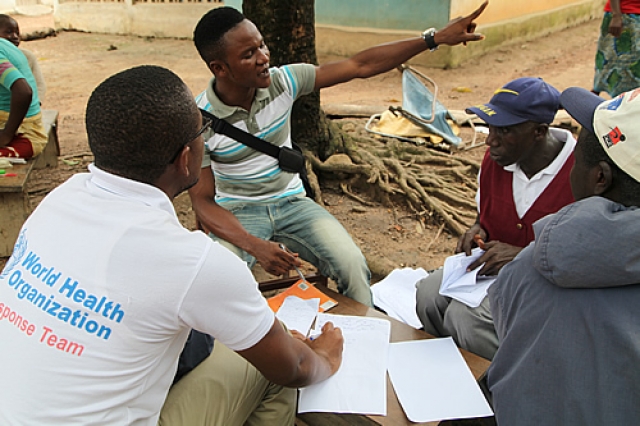WHO staff on the ground essential to breaking Ebola transmission chains
 Freetown/ Brazzaville, 24 August 2015 – Ongoing efforts to get to zero Ebola cases in Sierra Leone are yielding good results. This follows a massive deployment of experts by the World Health Organization and partners, to track and break each and every transmission chain of Ebola virus disease (EVD) through linking intensive community engagement and social mobilization efforts with surveillance and contact tracing.
Freetown/ Brazzaville, 24 August 2015 – Ongoing efforts to get to zero Ebola cases in Sierra Leone are yielding good results. This follows a massive deployment of experts by the World Health Organization and partners, to track and break each and every transmission chain of Ebola virus disease (EVD) through linking intensive community engagement and social mobilization efforts with surveillance and contact tracing.
The tracking and breaking of transmission chains requires tremendous numbers of qualified staff to work with the communities to identify if a person has been in contact with someone infected with EVD, monitor them for symptoms for up to 21 days, and to quickly isolate and treat them in a treatment centre if symptoms develop.
“Stopping Ebola transmission chains has required rapid mobilization of human and financial resources; this has been my top priority since my appointment,” says Dr Matshidiso Moeti, WHO Regional Director for Africa.
“Over 530 highly-skilled staff are currently deployed in Ebola affected countries through the Regional Office for Africa [AFRO] and many have taken on key leadership roles that have greatly facilitated community and social mobilization from the household up to the chiefdom/ward level,” adds Dr Moeti.
Through WHO’s strong leadership and coordination role among partners, as well as the consistent technical work on the ground, Sierra Leone is down to a single transmission chain. As at 24 August 2015, zero confirmed Ebola cases have been reported for the last two consecutive weeks. WHO’s integrated Ebola response, working with partners, has contributed significantly to this progress, as has the scaling up of community-owned social mobilization efforts aimed at getting to zero cases in West Africa.
“Staff from the Regional Office continue to support and harmonize actions to address the deeply entwined health, economic and social challenges that are being seen in Ebola affected countries,” said Dr Ibrahima-Soce Fall, Director of the Health Security and Emergencies Cluster at the WHO Regional Office for Africa.
“In addition, AFRO staff will continue to play essential roles in supporting recovery in the countries, especially strengthening health systems and building the needed capacities in order to prevent, detect and respond to Ebola and other public health threats,” adds Dr Fall.
Despite significant progress in the fight against Ebola, 38 contacts are still under monitoring in Sierra Leone, and 600 in Guinea, as of 24 August 2015. To get to zero cases in West Africa, WHO AFRO will continue to provide technical expertise and work with communities to better synergize efforts towards strengthening early warning systems and response.
________________________________
For more information, please contact:
Technical contacts:
Dr Ibrahima-Soce Fall; Tel: +472 413 9695; Email: socef [at] who.int
Dr Zabulon Yoti; Tel: +472 413 9915; Email: yotiza [at] who.int
Communications contacts:
Collins Boakye-Agyemang; Tel: + 472 413 9420; Email: boakyeagyemangc [at] who.int
Dr Cory Couillard; Tel: + 472 413 9995; Email: couillardc [at] who.int



